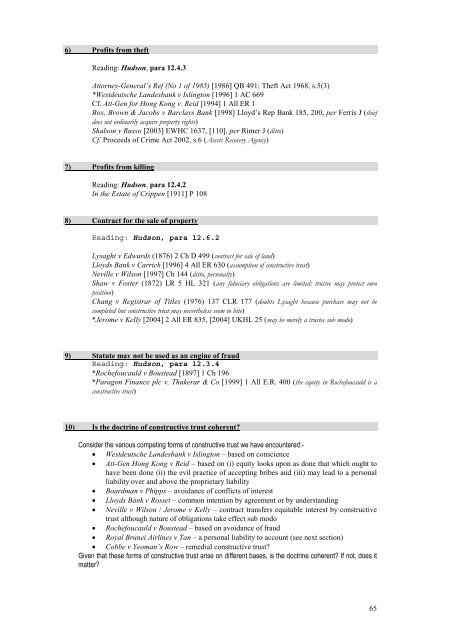Soton Equity and Trusts - alastairhudson.com
Soton Equity and Trusts - alastairhudson.com
Soton Equity and Trusts - alastairhudson.com
Create successful ePaper yourself
Turn your PDF publications into a flip-book with our unique Google optimized e-Paper software.
6) Profits from theft<br />
Reading: Hudson, para 12.4.3<br />
Attorney-General’s Ref (No 1 of 1985) [1986] QB 491; Theft Act 1968, s.5(3)<br />
*Westdeutsche L<strong>and</strong>esbank v Islington [1996] 1 AC 669<br />
Cf. Att-Gen for Hong Kong v. Reid [1994] 1 All ER 1<br />
Box, Brown & Jacobs v Barclays Bank [1998] Lloyd’s Rep Bank 185, 200, per Ferris J (thief<br />
does not ordinarily acquire property rights)<br />
Shalson v Russo [2003] EWHC 1637, [110], per Rimer J (ditto)<br />
Cf. Proceeds of Crime Act 2002, s.6 (Assets Recovery Agency)<br />
7) Profits from killing<br />
Reading: Hudson, para 12.4.2<br />
In the Estate of Crippen [1911] P 108<br />
8) Contract for the sale of property<br />
Reading: Hudson, para 12.6.2<br />
Lysaght v Edwards (1876) 2 Ch D 499 (contract for sale of l<strong>and</strong>)<br />
Lloyds Bank v Carrick [1996] 4 All ER 630 (assumption of constructive trust)<br />
Neville v Wilson [1997] Ch 144 (ditto, personalty)<br />
Shaw v Foster (1872) LR 5 HL 321 (any fiduciary obligations are limited: trustee may protect own<br />
position)<br />
Chang v Registrar of Titles (1976) 137 CLR 177 (doubts Lysaght because purchase may not be<br />
<strong>com</strong>pleted but constructive trust may nevertheless seem to bite)<br />
*Jerome v Kelly [2004] 2 All ER 835, [2004] UKHL 25 (may be merely a trustee sub modo)<br />
9) Statute may not be used as an engine of fraud<br />
Reading: Hudson, para 12.3.4<br />
*Rochefoucauld v Boustead [1897] 1 Ch 196<br />
*Paragon Finance plc v. Thakerar & Co [1999] 1 All E.R. 400 (the equity in Rochefoucauld is a<br />
constructive trust)<br />
10) Is the doctrine of constructive trust coherent?<br />
Consider the various <strong>com</strong>peting forms of constructive trust we have encountered:-<br />
Westdeutsche L<strong>and</strong>esbank v Islington – based on conscience<br />
Att-Gen Hong Kong v Reid – based on (i) equity looks upon as done that which ought to<br />
have been done (ii) the evil practice of accepting bribes <strong>and</strong> (iii) may lead to a personal<br />
liability over <strong>and</strong> above the proprietary liability<br />
Boardman v Phipps – avoidance of conflicts of interest<br />
Lloyds Bank v Rosset – <strong>com</strong>mon intention by agreement or by underst<strong>and</strong>ing<br />
Neville v Wilson / Jerome v Kelly – contract transfers equitable interest by constructive<br />
trust although nature of obligations take effect sub modo<br />
Rochefoucauld v Boustead – based on avoidance of fraud<br />
Royal Brunei Airlines v Tan – a personal liability to account (see next section)<br />
Cobbe v Yeoman’s Row – remedial constructive trust?<br />
Given that these forms of constructive trust arise on different bases, is the doctrine coherent? If not, does it<br />
matter?<br />
65













